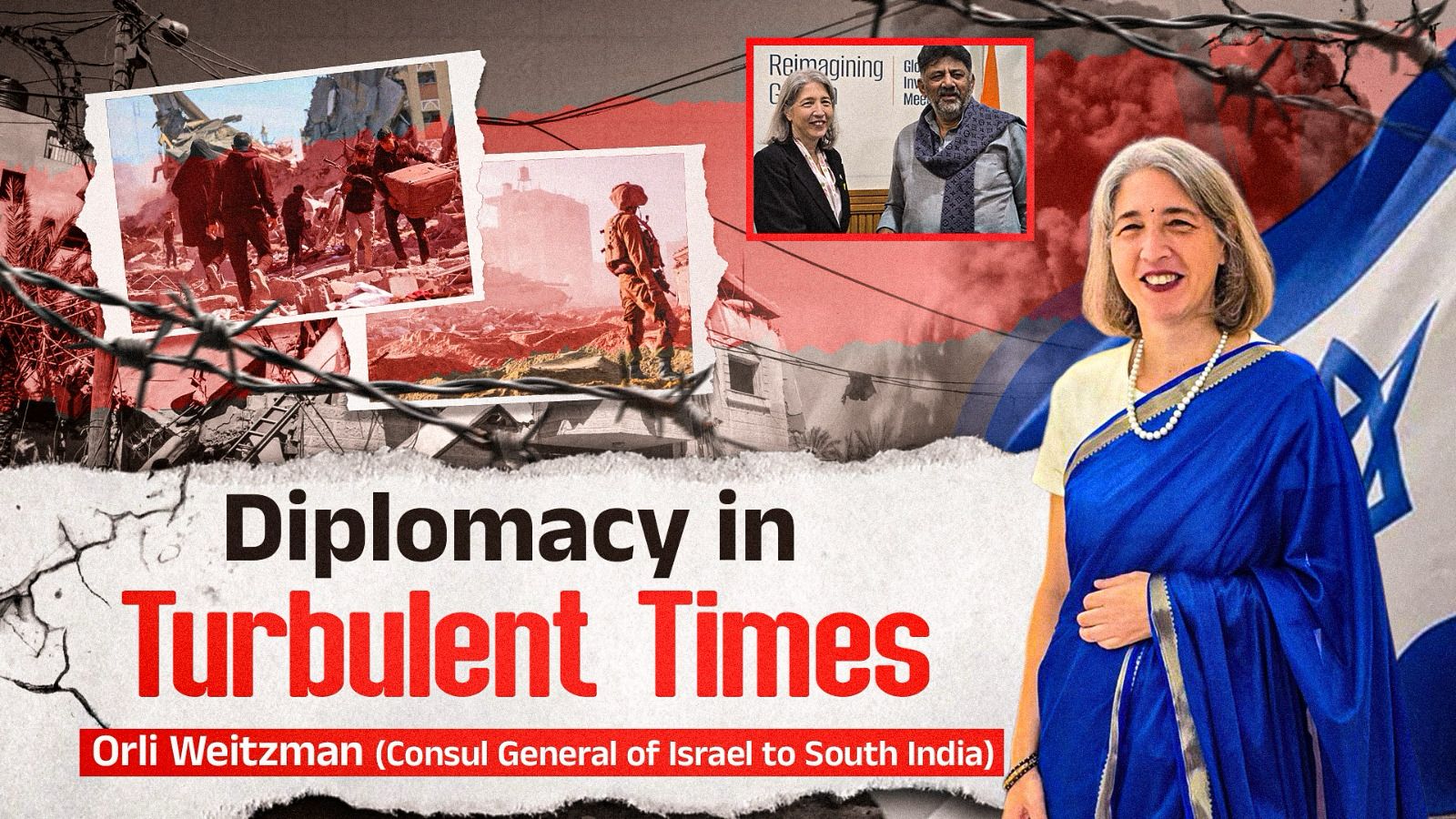Orli Weitzman described her posting in India as “an amazing year and one of the most interesting years that she ever had.
Published Aug 22, 2025 | 9:26 AM ⚊ Updated Aug 22, 2025 | 2:38 PM

Orli Weitzman, Consul General of Israel to South India.
Synopsis: Orli Weitzman, Consul General of Israel to South India, offered an in-depth look at her first year in Bengaluru, the growing India-Israel partnership, and the complexities of the Palestine conflict.
Orli Weitzman, Consul General of Israel to South India, in an exclusive interview with South First, offered an in-depth look at her first year in Bengaluru, the growing India-Israel partnership, and the complexities of the Palestine conflict.
Weitzman described her posting in India as “an amazing year and one of the most interesting years that she ever had.
She said coming to India was a new experience for her. “I had never been to India before, and I didn’t really know what to expect.” She admitted to initial uncertainties: “I was worried that the cultures might be very different, and they always seem so exotic and far away.”
However, she was pleasantly surprised by the cultural resonance between the two nations. “One of the things that amazed me most was how similar, actually the Indians and Israelis are,” she said. “It doesn’t matter with whom, what field I was talking to, people have the same values, the same culture, the same sense of humour. I think the most surprising thing was to discover how similar we are and how comfortable I feel here in Bengaluru.”
Bengaluru’s reputation as a technology hub clearly impressed the Consul General. She highlighted the city’s rapid pace of innovation, saying, “I’ve understood how advanced Bangalore is in terms of high tech and how the innovation ecosystem here is developing. It’s developing faster than the speed of light, basically.”
She also recounted engagement in various events, “One of the highlights that we had was participating in the Bangalore Tech summit last year. We’re very much looking forward to participating in a much bigger capacity this year.”
Weitzman explained that her role extends beyond Bengaluru to cover multiple South Indian states. “If we look at the bilateral relations between India and Israel altogether just as a whole, Israel has an embassy in Delhi and consulates in Mumbai and Bangalore. That shows the importance of the relationship between the two countries.”
“We see relations in innovation, whether it’s hackathons or mentorship programmes for young people. There are academic ties. We had a visit from the head of Hebrew University, one of Israel’s most prominent universities, who came here to South India.” The importance of South India in the global innovation ecosystem was central to this outreach, she added.
Agricultural technology is an area of particular strength. “Israel has 33 centres of excellence throughout India, five of them in South India,” Weitzman explained. These centres are dedicated to “bringing Israeli innovation and technologies to farmers and the agricultural scene in India.”
Despite such developments, challenges remain. One issue Weitzman pointed to was connectivity: “One of the main problems or difficulties I would say is the fact that there are no direct flights now from Israel to Bangalore. If there were direct flights, it would make the connections much easier because now it’s still a little bit far.” She noted that both Israelis and Indians show strong interest in cooperation and travel, but the lack of direct flights “makes it a bit complicated”.
Focusing on the ongoing war in Gaza, the diplomat addressed the humanitarian toll. She described Hamas as “a very, very cynical, horrible terrorist group that uses its civilian population as human shields”. Weitzman recounted horrific attacks by Hamas, saying, “They killed, raped and slaughtered babies, parents in front of their children. This is something that they knew that Israel would have no choice but to respond.” She added that Israel feels bad about this since nobody wants innocent civilians to get hurt except for Hamas.
On the issue of aid delivery, she said, “In the beginning, when the food was entered, Hamas was taking over the food and selling it at a very, very high price. They weren’t concerned about the welfare of Palestinians. Their main target is to destroy Israel.”
Weitzman also addressed the difficult topic of criticism and anti-Semitism worldwide. She stated, “It’s okay to criticise the government, but targeting Israelis who aren’t involved, or Jews because of Israeli policy, that’s anti-Semitism.” She cited examples of violence against Jewish people abroad and warned, “That’s a very dangerous, scary type of anti-Semitism that’s beginning to remind us of the beginning of the century in Europe.”
Weitzman’s core focus remains on strengthening connections. “For me, the top priority always is to keep developing relations between people-to-people relations between Israelis and Indians.”
(Edited by Muhammed Fazil.)
